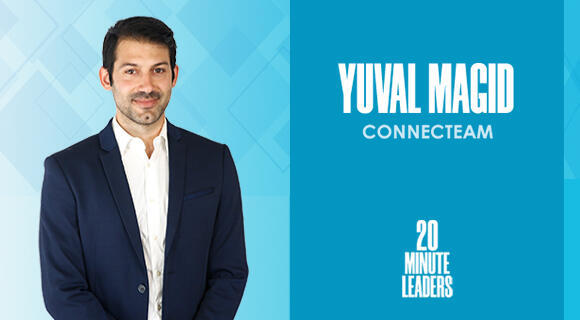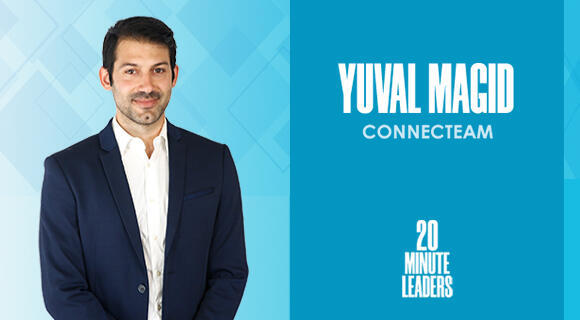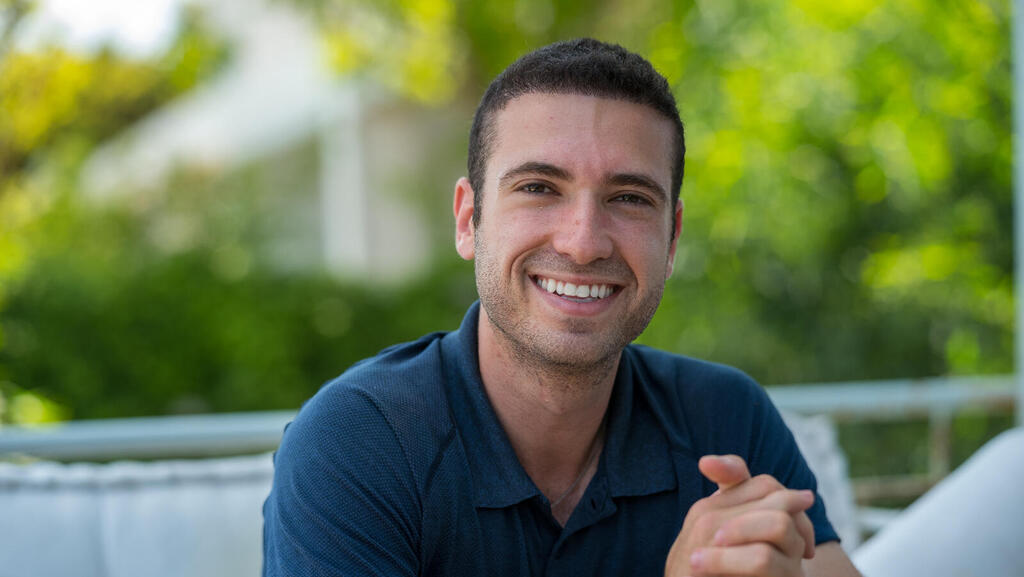
20-Minute Leaders
“You need to accept that things will break and be willing to build better out of it.”
More employees and managers today are not willing to go along with the way things have always been done, says Yuval Magid, chief operating officer at Connecteam.
More employees and managers today are not willing to go along with the way things have always been done, says Yuval Magid, chief operating officer at Connecteam. This means that the way organizations communicate with non-desk employees, like retail or restaurant workers, needs to advance from bulletin boards and paper forms. Connecteam aims to provide everything non-desk employees and managers need in one app, which allows them to communicate quickly as well as create schedules, track time, and assign tasks digitally. Magid shares Connecteam was fortunate to be ready with the right product at the right time as people began to demand this change. The company is actually a pivot from a previous one that was in the mobile learning space. He explains that it is important for everyone at Connecteam to have a mindset that accepts change and is ready to build something new and better after failure.
Yuval, you are looking at this non-desk employee all-in-one company app. What's happening here that this is an interesting space for you?
We need to start by better understanding our audience. So when you think about our customers, it's all those people that are not in front of a desk. Many times they don't even have emails, the Microsoft Office package, Slack. All those things are not available for this type of audience. Think about bus drivers, sellers in retail stores, cleaners, security guards: this type of audience comprises about 80% of the market. This is where Connecteam comes into the picture. Our vision is basically to bring everything employers and employees need under one roof. It's an employee management app. It can offer pretty much everything they need from day-to-day communication to time tracking, scheduling, digital forms. I think one of our biggest visions is to do something impactful for that part of the audience that is underserved.
How did the world look before?
We are talking bulletin boards, funneling down communication via face to face or maybe WhatsApp. Amir [Nehemia], our CEO and co-founder, was talking to a lot of C-level people from different industries. Connecteam is a pivot that was born out of Mobile Lesson. At the time, we were providing a Learning Management Solution. We came to a really big chain of food and beverage. That CEO just asked him, "But will I be able to know how many employees I have at every single moment?" Amir takes a step back and he says, "You don't know how many employees you have?" He's like, "No. It takes three months for things to funnel down from the branches to me."
That's kind of when things clicked, when we understood how far back this type of audience is when it comes to managing their workforce to understand what's going on in the workforce. We really understood that there is a core need to make things different. It's not a nice-to-have; it's an urgency.
Before, the way that organizations would manage people would be through these mid-level managers that would be consolidating this information and then trickling it down or up. But now you are saying, "If we are able to have direct communication with the frontline employees and get real time information, we have much more transparency."
Exactly. If we want to take it to a place that people can resonate a little bit more, most of us in Israel, we've done different service works. We worked at a restaurant or a bar.
I was at McDonald’s.
McDonald's is a very good example. You have your shifts; the manager needs to occupy those shifts. You need to bring your availability. There is so much back and forth. It takes forever, and no one enjoys the experience.
And today, you can do it with an app. You post your availability, he sets up the schedule and publishes it to you. You get the notification. You have a reminder before the shift. If you need to replace a shift, it's simple. They can approve it or deny it.
It sounds fantastic, but I'm sure you are sort of reeducating a market. So what are some of the challenges that are presented here?
I think it really depends on the time horizon. Things really changed over the past five years. When we first pitched that idea, initially, people should have had a really strong foresight for the fact that employees would have an app on their private phones and that they would actually use those phones for work-related purposes. Five years ago, if you had told that to someone from a VC, they would say, "I'm not sure that's how things are going to unfold."
But something super interesting happened in terms of the market. I think there is a new generation now, both from an employee's standpoint and from a manager's standpoint. Because of all those private life apps that basically trained us to be able to consume apps in a very simple way, people that used to be non-technological at all today can adopt apps as long as they are built the right way. So that type of barrier went down.
When you go into a company, you cannot accept that you need to come into the office to file a pen and paper form to take your vacation. I think that's the audience we are serving today. Those people that are just not willing to accept the way things used to be. I don't think we educated the market. I think we were very lucky to be at the right place at the right time with the right product.
From the market perspective, who is more of the pushing force? Is it the employees? Is it middle level management?
Today, it's definitely both. I think it started with those usually senior managers or business owners. But what we are seeing today is that more and more managers and employees that used to work with a tool like that are transitioning to other places and want to bring in a tool like that. But I think over 65, 70% of our customers are actually transitioning from pen and paper and Excel and bulletin boards. Only the other 30% are moving from a digital tool to our tool.
In a new world where teams are connected and you have seamless communication, transparency, and digitalization, what really is enabled in the world around us?
Think about what we did before we had Excel. Think about how more cumbersome it was, how people needed to put everything in writing. What becomes possible is for one to have everything in real time, to get real visibility. If you send a message, you know who read that message. If you send out a task, you can follow up on that task. Things become extremely more efficient. You are becoming much more proactive as a manager. You are focusing on the next levels of controlling your organization, providing different insights.
Now, from a go-to market perspective, how did you strategize? Was it by verticals?
We were told that you have to be vertical specific in order to succeed. But we really objected to it because everyone needs communication. Everyone needs time tracking. We really try to push that all-in-one experience and not to focus on a specific vertical. It was hard, especially in the early days. We are a very product-first type of company, which means our product was our salesperson. Connecteam didn't have any sales or CS people until we had 500 paying customers.
One of the smartest moves I think we did was remove the friction of the pricing as much as we could. We put very low price points at day one. Then we iterated with the product until it was mature enough, until we got the 500 paying customers. From there, we started to scale. That's when things really started booming.
Now from a culture perspective, how do you keep that sort of a special commando mentality?
I think it starts and ends with the people and the mentality. We are really trying to work hard on a day-to-day basis with everyone inside to get into the same mindset.
We don't fall in love with anything. We appreciate change. We appreciate people that love an environment that ever changes and know how to grow in that environment. You need to accept the fact that things would break, and you'll embrace it and you'll build better out of it. I think if you have people that share the same mindset, then you can really make big things together.
Michael Matias, Forbes 30 Under 30, is a Venture Fellow at Innovation Endeavors as well as investment Venture Partner at Secret Chord and J-Ventures. He studies Artificial Intelligence and Human-Computer Interaction at Stanford University, and was an engineer at Hippo Insurance. Matias previously served as an officer in the 8200 unit. 20MinuteLeaders is a tech entrepreneurship interview series featuring one-on-one interviews with fascinating founders, innovators and thought leaders sharing their journeys and experiences.
Contributing editors: Michael Matias, Megan Ryan














